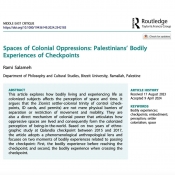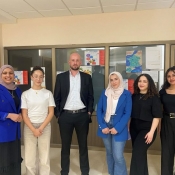1999 Student Council Election Begin at Birzeit University
Birzeit Student Council Elections began yesterday with rallies by each of the 4 student blocs contesting positions in the 51-seat student parliament.
The elections are considered important because they are widely seen as an indication of Palestinian popular opinion. Traditionally the elections have been a contest between the pro-Fatah Jerusalem Bloc and the Islamic Bloc. The years 1995 and 1997 saw the Jerusalem Bloc win a majority while in 1996 and 1998 the Islamic Bloc came out ahead.
This year four blocs are running in the election - the Jerusalem Bloc, An Nahdah Bloc, the Democratic Pole and the Change Bloc. Elections began on Saturday 20 March and will conclude with voting on Wednesay 24 March. Official results will be announced on Thursday morning.
Last year's elections were won by the Islamic Bloc with 39.4% of the vote. This year the Islamic Bloc is running in a coalition with the Bloc of the Martyr Fathi Shiqaqi, a second Islamic grouping on campus, which received 0.94% of the vote in 1998. Shiqaqi was a Birzeit University graduate who was assassinated in Malta in 1995. The new coalition has been called 'An Nahdah' (The Awakening) Bloc. A representative of Nahdah had this to say about the current negotiations between the Palestinian Authority and the Israeli government, "When the political process first started we warned that these agreements are leading nowhere. We see now what we tried to warn against back then. All these agreements are made and conducted to legitimize the Israeli occupation over land and man and to get Israel out of the international boycott that was falling in place before this process started. The Palestinians on the other side are suffering more discrimination and their situation is worsening daily."
The Jerusalem Bloc (or 'Shabiba') received the second highest number of votes last year with 37.24% of voters supporting them. This bloc is aligned with Yasser Arafat's Fatah movement and is concentrating on the issues of Jerusalem and the possible May announcement of an independent Palestinian state. A Jerusalem Bloc representative told BZU News that their main principles are:
- The establishment of an Independent Palestinian State with Jerusalem as its capital.
- Immediate and unconditional release of the Palestinian prisoners in the Israeli jails.
- The right of self-determination, and the right of return to all Palestinians wherever they are.
- Dismantlement of settlements in the Occupied Territories, and a halt to land confiscation and settlement activity.
The third bloc contesting the elections is the Democratic Pole which was formed in 1997 as a coalition of various left groups. The Pole is focusing its campaign this year on Palestinian identity, against what it sees as attempts to reduce the Palestinian question to Palestinians living in the West Bank and Gaza Strip. A Democratic pole representative told BZU News, "As long as Zionism exists as an exclusionary and racist ideology there can be no solution. Winning the rights of the Palestinian people means an end to that exclusion and racism. It means unity of our people, whether living here in the West Bank, in a refugee camp in Lebanon, or in the United States...After Oslo, Palestinian society was divided into two dominating blocs - the Islamist and the Palestinian Authority. We represent a third force and aim to regroup and strengthen those who don't agree with either of these blocs. "
The final bloc running this year is the Change Bloc, a non-factional student grouping which received 3.36% of the vote last year. Change is running on a platform of student independence from political parties, " The very complicated Palestinian political party structure is reflecting its complexes and failures on the student movement. To confront this, we aim to move towards the independence of the student movement from these outside structures without trying to escape from any of our national commitments."
The first day of campaigns saw rallies by each of the student blocs. Blocs were given one hour each to perform rallies demonstrating their main campaign ideas. Most University staff and students were outside to see these elaborate displays of music, song and dance combined with a strong political message. For full coverage of the day's rallies see the Birzeit 1999 election website.
On Monday the campaign rallies will continue, followed on Tuesday by an open debate between the blocs. Voting will commence Wednesday morning.






